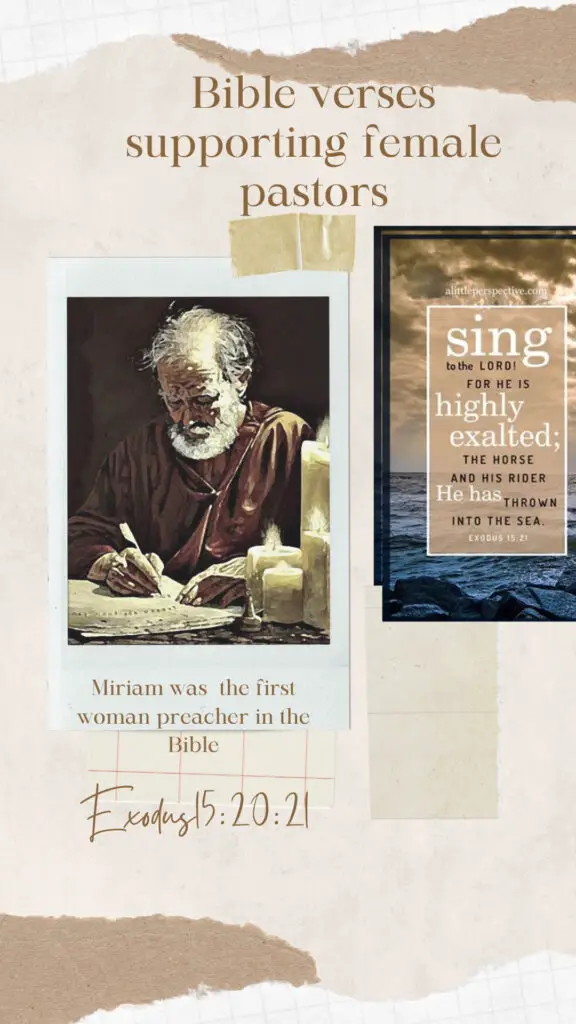Who was the first woman to preach in the Bible? Can a woman really preach in church? What about a female pastor, isn’t sinful for a woman to become a pastor?
After all, Paul said that women should keep silent in church and learn at home from their husbands.
But what if the woman doesn’t have a husband at home?
And even if she have a husband at home, what if he is not a Christian and he doesn’t know what the bible says about the question is wife is asking?
You see, we can go on and on with these questions, but my prime focus today is to answer the initial question (Who was the first Woman preacher in the Bible?)
The question isn’t new, and lot of people have been asking this question for a long time!
To be truthful, I wasn’t giving this question any thought until recently when I noticed that more and people keep asking about it.
As such, I decided to dig for answers in the bible. Some of the stories, contributions, and strength of women, and how God used them to do mighty things in ancient times caused me to break down and cry 😢 while writing this article.
But why is this subject and question so touchy, and why is it such a big deal, specially with women?
Well, women have always been important in Christianity, and they helped spread the word of God from the very beginning!
Sadly, people keeps forgeting about all the things women did for the church, and in the Bible where God used them to do mighty works like men.
For this reason, in this post we will look at the scriptures, and learn about who was the first female who preached in scriptures and get to know more about women who helped the people of God in the old Testament and church in the New Testament.
After reading this article, you will know who was the first lady preacher in the Bible and be able to prove it with scriptures from the Bible.
👉 But first, let’s look at a few important words that we must understand to get a better understanding about the subject matter. 🙏
Who is a Preacher?
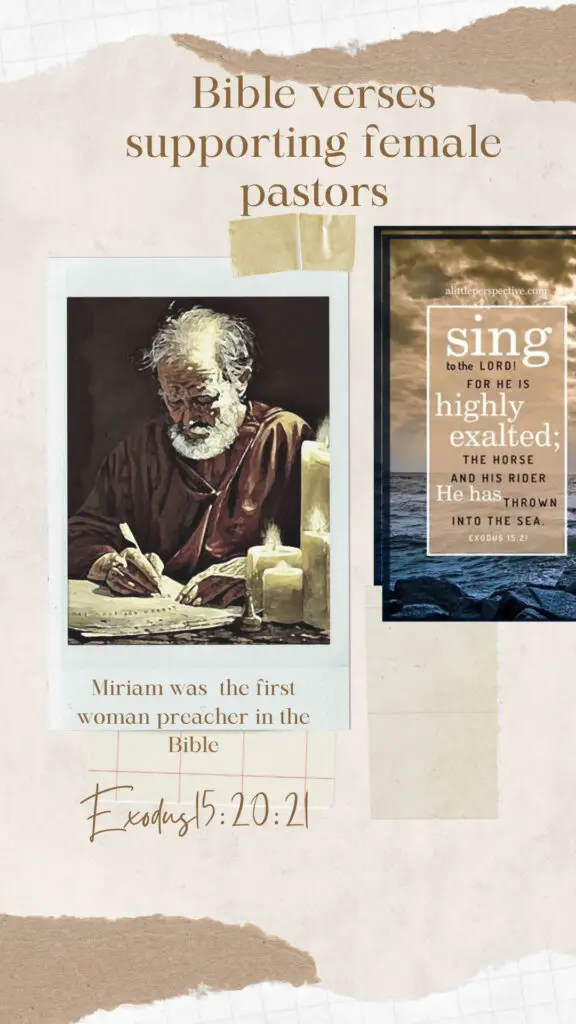
A preacher is someone who talks about God and teaches people about Him. They are chosen and called by God to do a special job!
But what exactly is that job? Well, different people might have different ideas, but what does God think a preacher should do? Let’s find out together!
Servant, Herald And Messenger
In the Bible, there are three words commonly use to describe these peosons who declars God’s message: minister, preacher, and evangelist.
These words describe not only what kind of person a preacher should be but also what they should do to serve God.
The word “minister”
This word comes from the Greek word diakonos, which means a servant or one who serves.
Therefore, a preacher is a servant of Jesus Christ (1 Tim. 4:6) whose work is to proclaim the Lord’s Word, the Gospel, to all people (Acts 6:4; Rom. 15:16).
A good minister of Jesus Christ must also remind the believers of the agenda of the kingdom of darkness(1 Tim. 4:6) and fulfill the ministry that he has received from the Lord (Col. 4:17).
The word “preacher”
This word comes from the Greek word kerux, which means a herald or a public proclaimer.
A preacher is like a herald who authoritatively declares the king’s law to the people, which must be obeyed.
The Lord authorized and sent out His preachers into all the world to proclaim His message, the Gospel (Rom. 10:14-18; 2 Tim. 2:1-7; 4:1-5).
The word “evangelist”
This comes from the Greek word euangelistes, which means a messenger of good news. Christ gave evangelists (Eph. 4:11-12) to bear His good message, the “gospel.”
Paul charged preachers to “do the work of an evangelist, make full proof of thy ministry” (1 Tim. 4:5).
In other words, preachers should proclaim the word, be ready in season and out of season, reprove, rebuke, exhort with all patience and instruction (2 Tim. 4:2).
We just learned about preachers and what they do, right?
Well, now we’re going to learn about prophets, which is related to what we just talked about. So, are you ready to discover who prophets are? Let’s go!
👉 Healing Scriptures for Women (10 Powerful Bible Verses)
Who is a prophet, or prophetess?
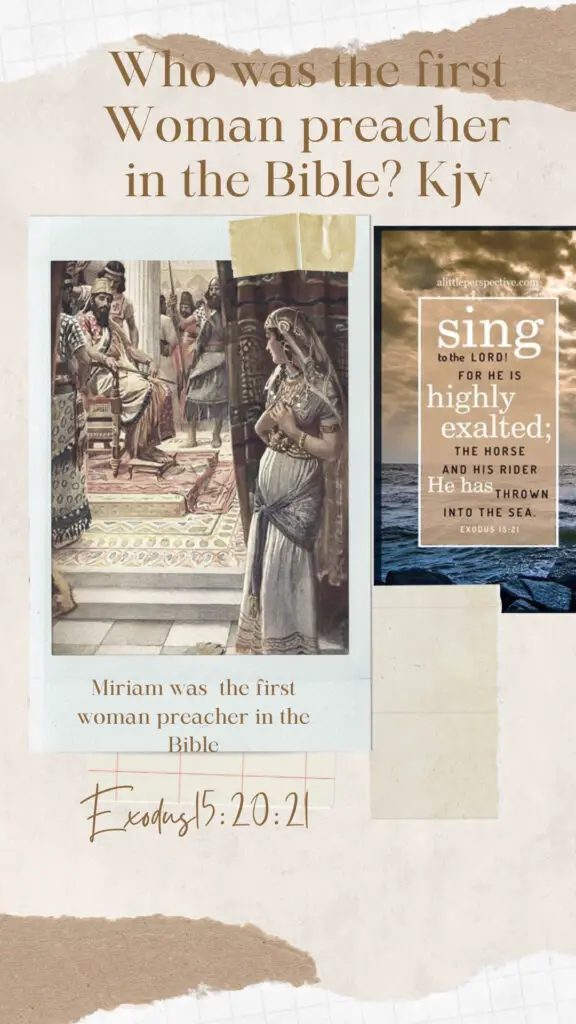
The Greek word for prophet is “prophētēs” (προφήτης).
In the Bible, a prophet is someone who is chosen by God to speak on His behalf, conveying His messages and teachings to the people.
The word prophet comes from the Greek verb “prophēteuō” (προφητεύω), which means “to speak forth” or “to declare openly”.
In the Old Testament, many prophets were given visions and dreams by God, and they shared these messages with the people of Israel.
In the New Testament, the role of the prophet is also important, with prophets receiving messages from God through the Holy Spirit and sharing them with the early Christian communities.
With all of that said, to put simply, a prophet or a prophetess is someone chosen by God to speak His message.
This happened a long time ago in Israel, and still happens in the Church today. The Holy Spirit helps the prophet to know what to say.
👉 What does the Bible Say about Queens?
Is a prophet and a preacher the same?
What is the difference between a preacher and a prophet? Good question, and one that crossed my mind while writing this article.
From what I know and what the Bible teaches, a preacher teaches us about God’s Word.
A prophet, on the other hand, is a messenger who shares God’s Word with us. But… aren’t they the same thing? Absolutely, they are the same thing, they both declare God’s words to his people.
Moreover, person chosen and sent by God to share his message is a preacher, be it on a pulpit, in the open fields, or wherever they share God’s words with people.
That said, some people might think that prophets can tell the future, but that’s not really true. A prophet chosen and sent by God only shares what God shows or tells them to say.
Sometimes, that might include things that will happen in the future. But the prophet isn’t trying to predict anything – they’re just passing along God’s message.
Likewise, a preacher is someone who shares the message that the Holy Spirit has given them.
So, a preacher might be a pastor, apostle, teacher, evangelist, prophet, or any believer sent by God to share his words.
👉 “A Must Read” 👉 The Truth: Top 10 Bible Verses Supporting Female Pastors and Preachers: Kjv
First Woman Preacher in the Bible
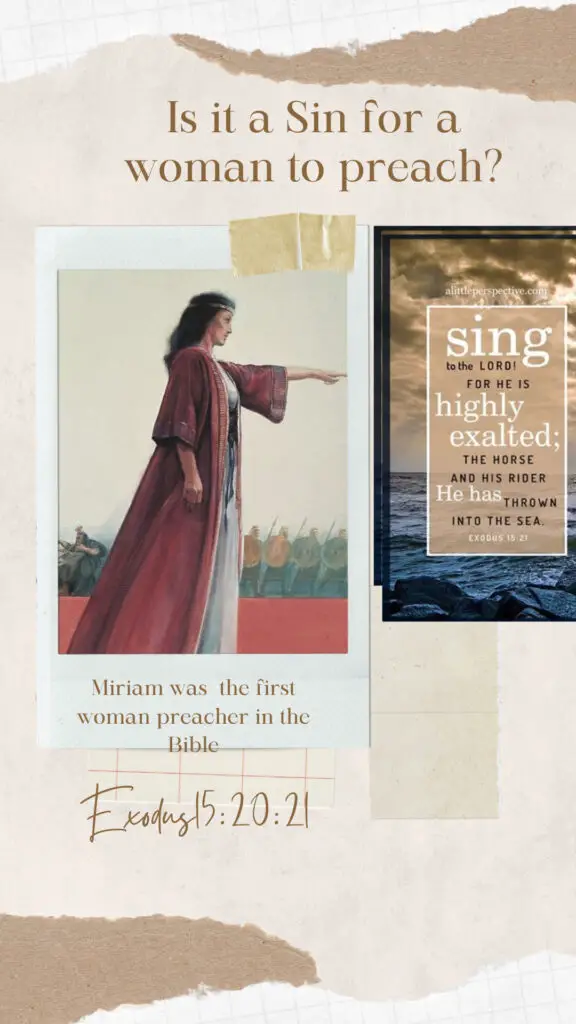
It’s important to understand the historical context of the Bible. During biblical times, long time ago when the Bible was written, things were different than they are now.
In the time of the patriarchal society, coupled with Jewish and Roman laws, girls and ladies didn’t have as many chances as boys and men did.
Their value was not perceived as important and they didn’t have as many choices and opportunities to excel.
People back then thought men were better than women, and there were laws that made it hard for ladies to do things.
But even with these rules holding them back, women still did very important things in the early church.
Jesus, who is talked about in the New Testament, was different from other people at the time.
👉 Break the Evil Cycle and Spell of Bad Luck
He didn’t think women were worth less than men, and he treated them the same. He was kind to them and showed them respect, even when others didn’t.
Infact, women disciples, such as Mary Magdalene, Joanna, and Susanna, followed Jesus and supported his ministry.
Women held leadership positions in the early church, with Phoebe, for instance, described as a “servant of the church” in Romans 16:1-2.
And instructions were given by Paul that the saints of the church at Rome must help her with whatsoever she needs.
This shows us that Phoebe held a leadership position in the church, and even apostle Paul acknowledged it to be so.
I commend unto you Phebe our sister, which is a servant of the church which is at Cenchrea:2 That ye receive her in the Lord, as becometh saints, and that ye assist her in whatsoever business she hath need of you: for she hath been a succourer of many, and of myself also.
Romans 16:1-2
Now, onto the main question – who was the first woman preacher in the Bible?
Several possible candidates have emerged based on key biblical passages, let’s take a look:
Miriam was the first woman preacher in the Bible
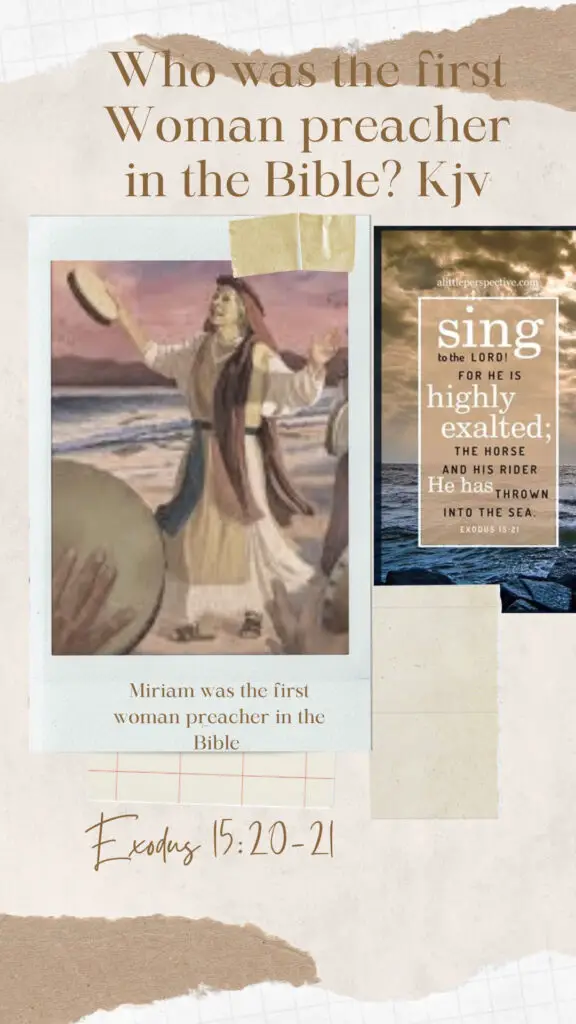
Miriam, the sister of Moses, who led the Israelites in worship and song after crossing the Red Sea is according to scripture is the very fist woman preacher in the Bible. Miriam was also the first mentioned female prophet in the Bible.
In Exodus 15:20-21, it is written,
“Then Miriam the prophetess, Aaron’s sister, took a tambourine in her hand, and all the women followed her, with tambourines and dancing. Miriam sang to them: ‘Sing to the Lord, for he is highly exalted. The horse and its rider he has hurled into the sea.’”
Exodus 15:20-21
Some scholars argue that this passage suggests Miriam’s role as a preacher and leader in the early Israelite community.
And based on the Bible’s description of who a preacher is, I do believe that Miriam was a leader of some sort and also the first woman preacher in the Bible.
But wasn’t Moses, the servant of the Lord authorized by God to declare his laws to Israel, his people?
Yes, but God also spoke with Miriam the prophetess to share his message with others.
And Miriam and Aaron spake against Moses because of the Ethiopian woman whom he had married: for he had married an Ethiopian woman.
And they said, Hath the LORD indeed spoken only by Moses? hath he not spoken also by us? And the LORD heard it.
(Now the man Moses was very meek, above all the men which were upon the face of the earth.)
And the LORD spake suddenly unto Moses, and unto Aaron, and unto Miriam, Come out ye three unto the tabernacle of the congregation. And they three came out.
And the LORD came down in the pillar of the cloud, and stood in the door of the tabernacle, and called Aaron and Miriam: and they both came forth.
And he said, Hear now my words: If there be a prophet among you, I the LORD will make myself known unto him in a vision, and will speak unto him in a dream.
My servant Moses is not so, who is faithful in all mine house.
With him will I speak mouth to mouth, even apparently, and not in dark speeches; and the similitude of the LORD shall he behold: wherefore then were ye not afraid to speak against my servant Moses?
Number 12:1-8
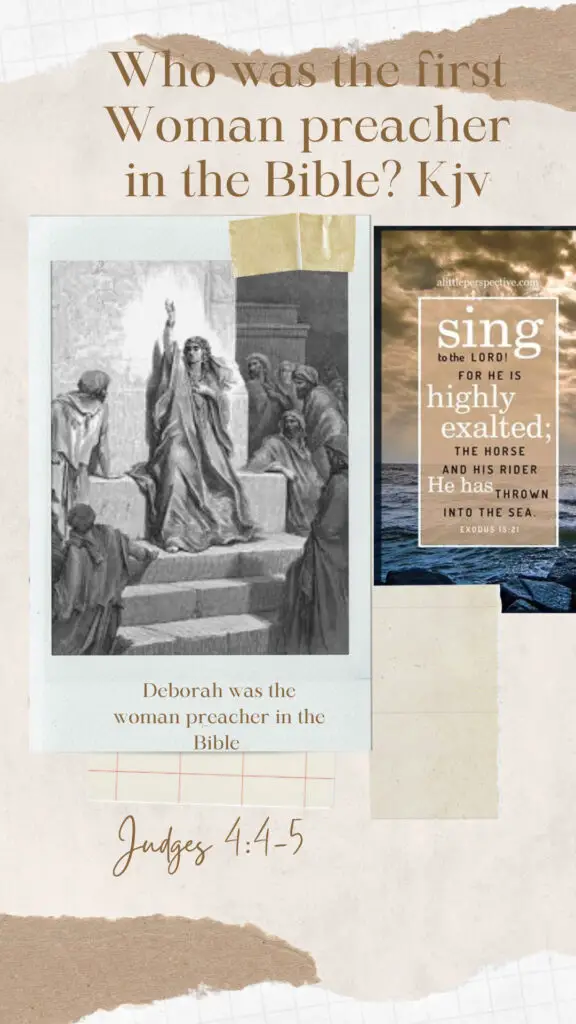
Wasn’t Deborah the first woman preacher in the Bible?
Another possible candidate is Deborah, a prophetess and judge in Israel, who encouraged and guided Barak in battle against the Canaanites. In Judges 4:4-5, it is written,
“Now Deborah, a prophet, the wife of Lappidoth, was leading Israel at that time. She held court under the Palm of Deborah between Ramah and Bethel in the hill country of Ephraim, and the Israelites went up to her to have their disputes decided.”
Judges 4:4-5
Additionally, in Judges 5:7, it is written,
“Villagers in Israel would not fight; they held back until I, Deborah, arose, until I arose, a mother in Israel.”
Judges-5-7
Deborah’s leadership and prophetic role was exceptional, but she was not the first woman preacher in the Bible, Mariam is.
Our final candidate is Mary Magdalene:
Mary Magdalene was first woman preacher in the Bible to preach the resurrection of Jesus
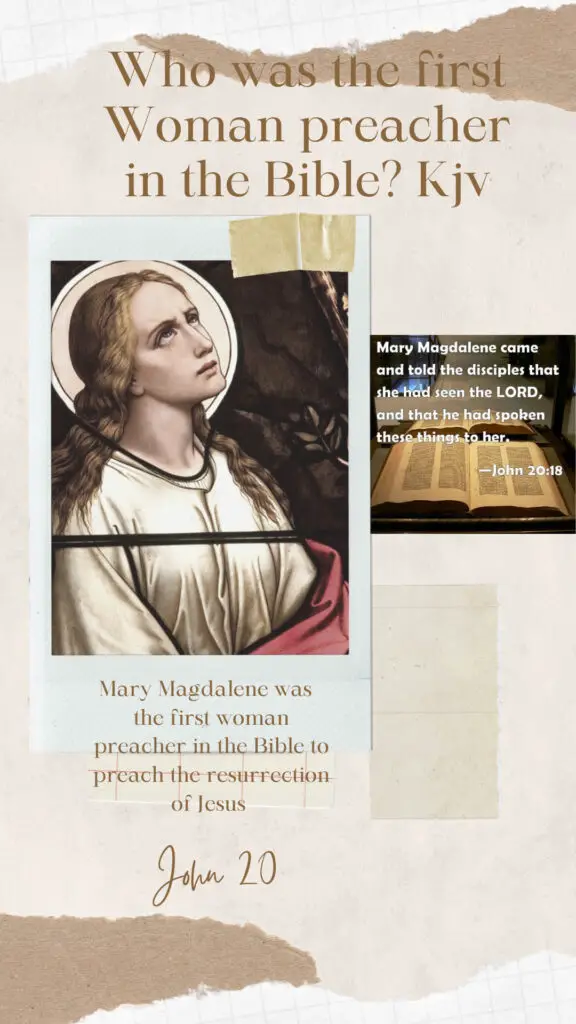
Mary Magdalene, a prominent figure in the New Testament, was a follower of Jesus and a witness to his crucifixion and resurrection.
She and another woman whose name was also Mary were not only the first women preachers in the Bible to preach the resurrection of Christ but they were also the first preachers sent by Christ to tell others that he is risen.
In the end of the sabbath, as it began to dawn toward the first day of the week, came Mary Magdalene and the other Mary to see the sepulchre.
And, behold, there was a great earthquake: for the angel of the Lord descended from heaven, and came and rolled back the stone from the door, and sat upon it.
His countenance was like lightning, and his raiment white as snow: And for fear of him the keepers did shake, and became as dead men.
And the angel answered and said unto the women, Fear not ye: for I know that ye seek Jesus, which was crucified. He is not here: for he is risen, as he said. Come, see the place where the Lord lay.
And go quickly, and tell his disciples that he is risen from the dead; and, behold, he goeth before you into Galilee; there shall ye see him: lo, I have told you. And they departed quickly from the sepulchre with fear and great joy; and did run to bring his disciples word.
And as they went to tell his disciples, behold, Jesus met them, saying, All hail. And they came and held him by the feet, and worshipped him.
Then said Jesus unto them, Be not afraid: go tell my brethren that they go into Galilee, and there shall they see me.
Mary’s story begins in the Gospels, where she is mentioned as one of the women who traveled with Jesus and his disciples, supporting them with their resources.
And I must add this, according to the account of apostle John, Mary Magdalene was present at the crucifixion of Jesus and was the first person to see the risen Christ and to preach to others about his resurrection.
Therefore, based on this we can confidently say that Mary Magdalene was indeed the first woman preacher in the Bible to preach the resurrection of the Lord Jesus Christ.
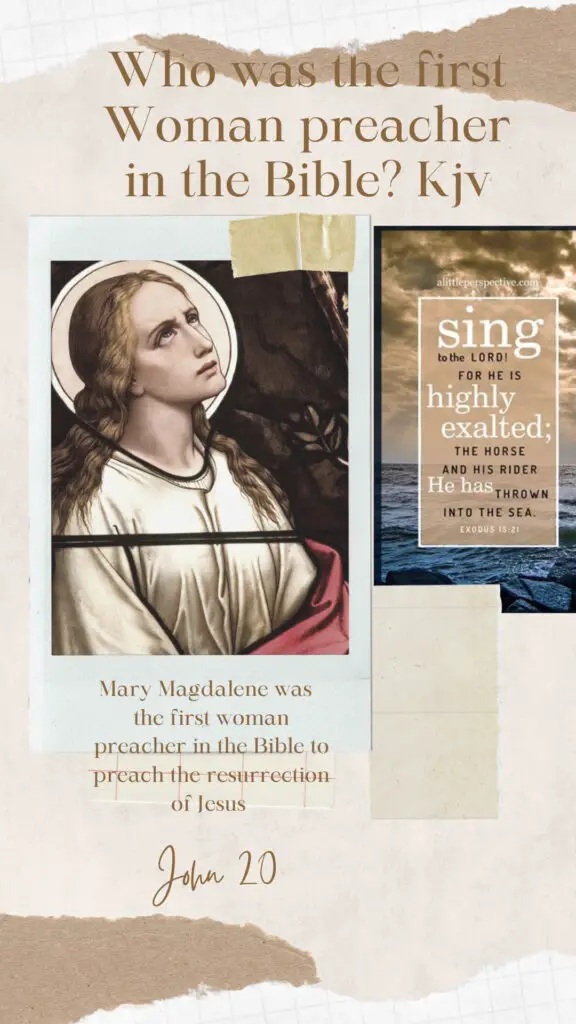
Please read John 20:1-18 below to see it for yourself ⏬️
1The first day of the week cometh Mary Magdalene early, when it was yet dark, unto the sepulchre, and seeth the stone taken away from the sepulchre.
2Then she runneth, and cometh to Simon Peter, and to the other disciple, whom Jesus loved, and saith unto them, They have taken away the Lord out of the sepulchre, and we know not where they have laid him.
3Peter therefore went forth, and that other disciple, and came to the sepulchre.
4So they ran both together: and the other disciple did outrun Peter, and came first to the sepulchre.
5And he stooping down, and looking in, saw the linen clothes lying; yet went he not in.
6Then cometh Simon Peter following him, and went into the sepulchre, and seeth the linen clothes lie,
7And the napkin, that was about his head, not lying with the linen clothes, but wrapped together in a place by itself.
8Then went in also that other disciple, which came first to the sepulchre, and he saw, and believed.
9For as yet they knew not the scripture, that he must rise again from the dead.
10Then the disciples went away again unto their own home.
11But Mary stood without at the sepulchre weeping: and as she wept, she stooped down, and looked into the sepulchre,
12And seeth two angels in white sitting, the one at the head, and the other at the feet, where the body of Jesus had lain.
13And they say unto her, Woman, why weepest thou? She saith unto them, Because they have taken away my Lord, and I know not where they have laid him.
14And when she had thus said, she turned herself back, and saw Jesus standing, and knew not that it was Jesus.
15Jesus saith unto her, Woman, why weepest thou? whom seekest thou? She, supposing him to be the gardener, saith unto him, Sir, if thou have borne him hence, tell me where thou hast laid him, and I will take him away.
16Jesus saith unto her, Mary. She turned herself, and saith unto him, Rabboni; which is to say, Master.
17Jesus saith unto her, Touch me not; for I am not yet ascended to my Father: but go to my brethren, and say unto them, I ascend unto my Father, and your Father; and to my God, and your God.
18Mary Magdalene came and told the disciples that she had seen the Lord, and that he had spoken these things unto her.
John 20:1-18
Her testimony was a powerful witness to the resurrection, and it inspired the disciples to believe.
Moreover, Mary’s role as a witness and a preacher is significant not only because she was the first person to see the risen Christ, but also because she was a woman in a culture where women were not allowed to hold positions of authority or leadership.
By sharing her testimony, Mary challenged the traditional gender roles of her time and paved the way for women to serve as leaders in the church.
Despite the importance of her role, Mary’s story has been distorted and rewritten throughout history to support the positions of those who told her story.
For many years, she was identified as a prostitute, a misconception that has been debunked by scholars who note that there is no evidence in the Bible to support this claim.
In recent years, scholars have worked to reclaim Mary’s story and to recognize her as a powerful witness and preacher.
Today, Mary Magdalene remains an inspiration to women of faith around the world.
Her story reminds us that God calls all of us to share our testimony and to proclaim the Good News, regardless of our gender or social status.
May we follow in her footsteps, boldly proclaiming the risen Christ and sharing the Good News with all who will listen.
Is it a Sin for a woman to preach?
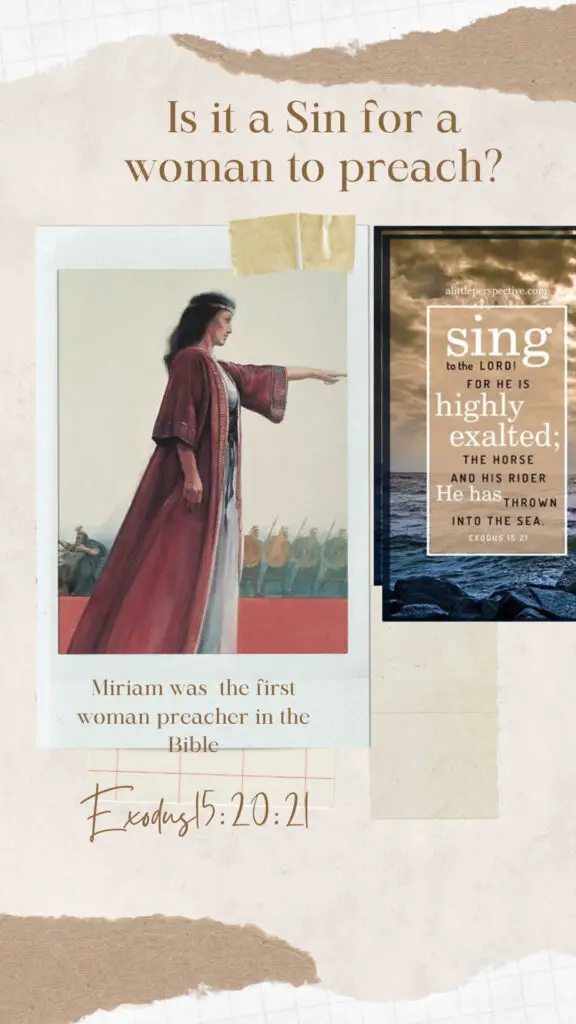
It is not a sin for a woman to preach. Sure, some people believe that women should not preach or teach in the church because of certain passages in the Bible, while others believe that women can and should preach.
The main passage that is often cited as evidence that women should not preach is 1 Timothy 2:12, which says:
“I do not permit a woman to teach or to assume authority over a man; she must be quiet.”
Timothy 2:12
However, it’s important to understand the context of this verse. Paul was addressing a specific situation in the church in Ephesus where some women were teaching false doctrine and causing problems.
He was not making a blanket statement that women should never teach or preach in any context.
In fact, there are many examples in the Bible of women who preached and taught. For example, in Acts 18:26, Priscilla and her husband Aquila explain the way of God more adequately to Apollos.
In Romans 16:1-2, Paul commends Phoebe, a deaconess who likely had a teaching role in the church.
And in Joel 2:28-29, God says that in the last days, he will pour out his Spirit on all people, including women, who will prophesy.
Is it right for a woman to preach on the altar?
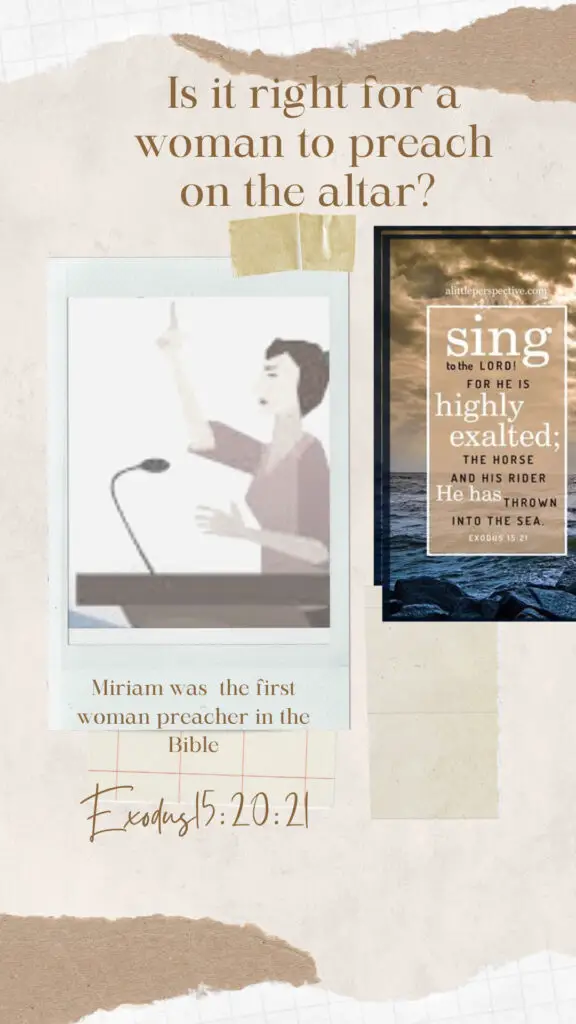
Yes, a woman can preach on the altar of God. As we have mentioned already, in the Bible, there are examples of women who preached and taught about God.
One of these examples is in the book of Acts, where Priscilla and her husband Aquila taught a man named Apollos about Jesus (Acts 18:24-26).
Priscilla was an equal partner with her husband in teaching about Jesus, and there is no indication that her gender was a hindrance to her teaching.
Another example is in the book of Joel, where God says that in the last days, He will pour out His Spirit on all people, and “your sons and daughters will prophesy” (Joel 2:28).
This prophecy was fulfilled in Acts 2, where both men and women received the Holy Spirit and began to speak in different languages, proclaiming the wonders of God.
Regarding the significance of the altar in the Bible, it was a place of sacrifice and worship.
In the Old Testament, people would bring animals to the altar to offer as sacrifices to God.
The altar was also a place where people would pray and seek God’s guidance.
In the New Testament, Jesus became the ultimate sacrifice for our sins, so there is no longer a need for animal sacrifices.
However, the altar still represents a place of worship and surrender to God. It is a place where we come to offer ourselves to God and seek His will for our lives.
What does the Bible say about women in ministry?
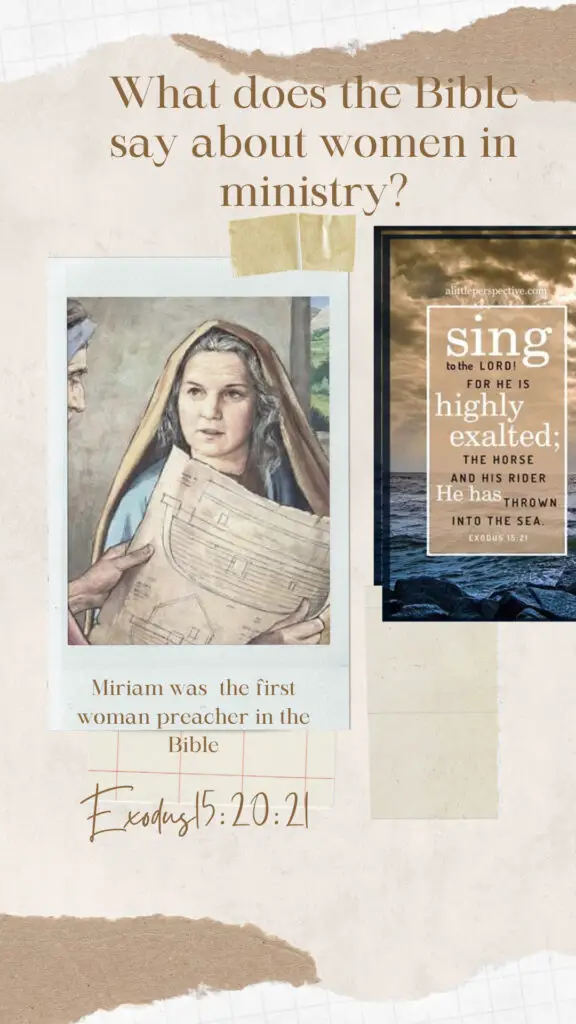
The Bible affirms that women have a valuable and vital role to play in the ministry of the church. Women are called to be disciples of Christ, to share the gospel, and to exercise spiritual gifts for the building up of the body of Christ.
For example, in Galatians 3:28, it says, “There is neither Jew nor Gentile, neither slave nor free, nor is there male and female, for you are all one in Christ Jesus.” This passage emphasizes that in Christ, all believers are equal, regardless of their gender.
Furthermore, in Acts 2:17-18, the Holy Spirit is poured out on both men and women, and both are called to prophesy. This passage suggests that women can exercise spiritual gifts and participate in the ministry of the church.
Additionally, in Romans 16:1-2, Paul commends Phoebe, a deaconess, to the church in Rome. This passage indicates that women can hold positions of leadership and service in the church.
Bible verses supporting female pastors, women in ministry, and women preachers kjv
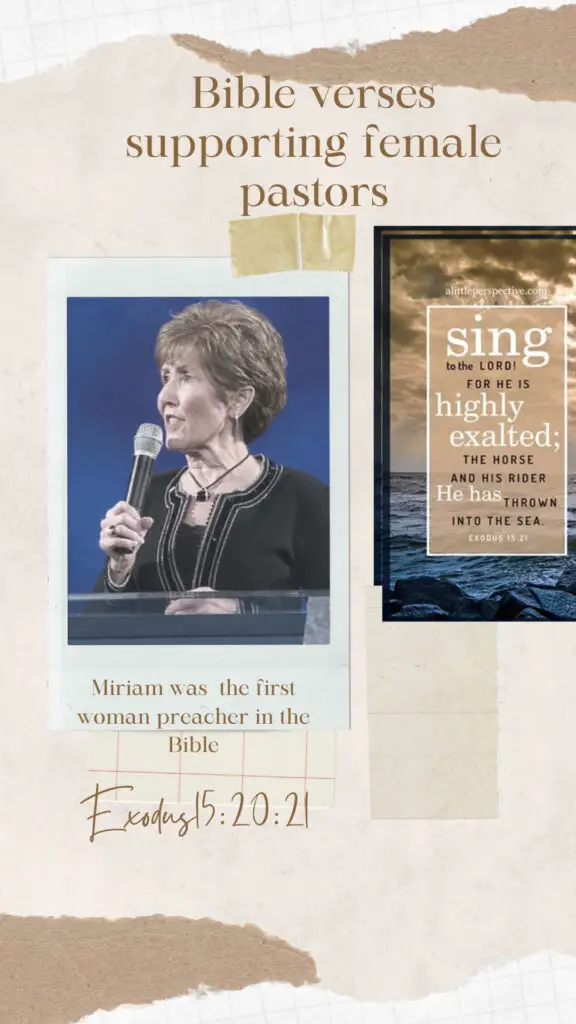
Here are 15 Bible verses that are often cited in support of women in ministry, female pastors, and women preachers, based on the King James Version (KJV) of the Bible:
Galatians 3:28
“There is neither Jew nor Greek, there is neither bond nor free, there is neither male nor female: for ye are all one in Christ Jesus.” – Galatians 3:28
Joel 2:28
“And it shall come to pass afterward, that I will pour out my spirit upon all flesh; and your sons and your daughters shall prophesy, your old men shall dream dreams, your young men shall see visions.” – Joel 2:28
Exodus 15:20
“And Miriam the prophetess, the sister of Aaron, took a timbrel in her hand; and all the women went out after her with timbrels and with dances.” – Exodus 15:20
1 Timothy 2:12
“But I suffer not a woman to teach, nor to usurp authority over the man, but to be in silence.” – 1 Timothy 2:12
Acts 2:18
“And on my servants and on my handmaidens I will pour out in those days of my Spirit; and they shall prophesy.” – Acts 2:18
1 Corinthians
“Let your women keep silence in the churches: for it is not permitted unto them to speak; but they are commanded to be under obedience as also saith the law.” – 1 Corinthians 14:34
Romans 16:12
“Salute Tryphena and Tryphosa, who labour in the Lord. Salute the beloved Persis, which laboured much in the Lord.” – Romans 16:12
Romans 16:1
“I commend unto you Phebe our sister, which is a servant of the church which is at Cenchrea.” – Romans 16:1
Acts 21:9
“The same had four daughters, virgins, which did prophesy.” – Acts 21:9
Judges 4:4
“And Deborah, a prophetess, the wife of Lapidoth, she judged Israel at that time.” – Judges 4:4
1 Kings 5:12
“And the Lord gave wisdom unto Solomon, as he promised him: and there was peace between Hiram and Solomon; and they two made a league together.” – 1 Kings 5:12
Philippians 4:3
“And I intreat thee also, true yokefellow, help those women which laboured with me in the gospel, with Clement also, and with other my fellowlabourers, whose names are in the book of life.” – Philippians 4:3
Mark 16:15
“And she said unto them, Go ye into all the world, and preach the gospel to every creature.” – Mark 16:15
1 Corinthians 12:18
“But now hath God set the members every one of them in the body, as it hath pleased him.” – 1 Corinthians 12:18
Ephesians 4:11-12
“And he gave some, apostles; and some, prophets; and some, evangelists; and some, pastors and teachers; For the perfecting of the saints, for the work of the ministry, for the edifying of the body of Christ.” – Ephesians 4:11-12
Final word on who was the first Woman preacher in the Bible Kjv
In conclusion, according to the King James Version (KJV) of the Bible, Miriam was the first woman preacher mentioned in the scriptures.
As noted in Exodus 15:20, Miriam, the sister of Aaron, took a timbrel in her hand and led the women in song and dance to celebrate the Lord’s deliverance of the Israelites from Egypt.
In this context, Miriam is referred to as a “prophetess,” indicating that she was a spokesperson for God and had a message to convey to the people.
Miriam’s role as a preacher and leader of worship is significant because it demonstrates that God can use women to lead His people and speak on His behalf.
While some may argue that this passage does not explicitly state that Miriam preached or taught, the fact that she is identified as a prophetess suggests that she had a significant role in communicating God’s message to the people.
Furthermore, the New Testament affirms the importance of women in leadership and ministry. In Acts 2:17-18, the Holy Spirit is poured out on both men and women, and both are called to prophesy.
Additionally, Paul commends several women who were involved in ministry, including Phoebe, a deaconess (Romans 16:1-2), and Junia, who is described as an apostle (Romans 16:7).
In light of these passages, it is clear that God has a plan and a purpose for women in ministry and that they can play a vital role in preaching, teaching, and leading His people.
Miriam’s example serves as a reminder that women have been preaching and leading worship since the earliest days of the Bible and that their contributions are essential to the work of the Kingdom.

Faithway.info, your online sanctuary for deepening your spiritual journey and mastering the teachings of the Bible. At Faithway.info, we are passionate about making the wisdom of the Bible accessible to everyone, fostering a community dedicated to growth, understanding, and support.
